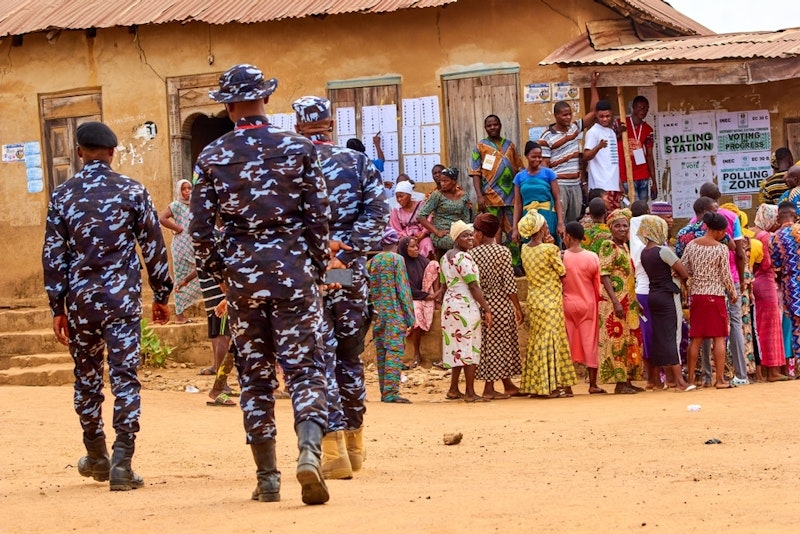In the News
Is the future bright for Nigeria?

1st March 2023
Last weekend the people of Nigeria headed to the polls to elect a new president, following the resignation of Muhammadu Buhari. Despite having the biggest and fastest growing economy, and the biggest and fastest growing population in Africa, this former British colony is a country experiencing economic hardship, worsening insecurity and general unhappiness, which meant that this election took place amid a backdrop of unrest. For those of you who teach Nigeria as your NEE case study, the election will be a great update.
Over the last two decades Nigeria has emerged as a country to watch - a booming economy, the second biggest film industry in the world, huge infrastructure projects taking place left, right and centre. But, Nigeria is no stranger to unrest and has faced almost continual instability since gaining independence, including a military coup and civil war in the 1960s, the religion inspired Maitatsine Riots of the 1980s, militancy in the Niger Delta since the 1990s and the threat of terrorism from extremist group Boko Harem for the last 15 years.
But at the moment the economy is causing a huge headache right across the country. Nigeria is currently rolling out new banknotes - but this roll-out has not gone to plan with a huge shortage in physical cash since the central bank started to swap the old local naira currency notes for the new ones. Many businesses have refused to accept the old currency leading to huge queues of angry customers who are unable to swap their old notes for new. And of course many Nigerians work in the informal economy, so are reliant on cash for transactions rather than banking apps.
Having thousands of people blocking roads and attacking banks in response is not what country leaders want to see as their people head to the polls.
However, there are glimmers of hope for the future. This election has been seized upon by the youth of Nigeria, with millions of young people registering as first time voters, showing how politicians in countries with youthful populations must tailor their policies to this ‘president-making’ generation. A record 93 million people have registered to vote, 40% of whom are under 35.
It has also sparked a change in the normal two party system of Nigeria with many backing a third-party candidate to bring about a change after years of stagnation, corruption and insecurity, which has hindered economic growth. Peter Obi of the Labour Party is described as 'the frugal businessman capturing young Nigerian's hearts', and has stood against ruling All Progressives Congress (APC) and Peoples Democratic Party (PDP), who have alternated in power since the end of military rule in 1999. Despite him being a member of the PDP until last year, he is seen as a 'fresh face' and has emerged as a powerful force, energising voters with messages of prudence and accountability, with an army of social media users backing him and reinforcing his popularity.
At the time of writing, the likelihood of Peter Obi being elected President is still up in the air*, although he has caused upset by winning Nigeria's biggest city - Lagos. However we might not know for days who has won overall. There have been delays due to technical faults and a lack of internet to upload results in some areas, officials refusing to upload some results, and attacks on polling stations, including ballot box snatching and attacks by armed men, particularly in southern areas where Mr Obi has his support base. These events led to voting being postponed until Sunday in parts of the country.
In a major win for the process of democracy, these elections have seen high voter turnout, especially among young people in what has been the biggest democratic exercise in Africa, even though it may not look like the most democratic process at the moment!

Thinking about the future
One way of Nigeria (and other African nations) bridging the development gap is to eliminate corruption, and despite Nigeria’s vast oil and gas reserves, its development has been held back since independence in 1960 by widespread instability.
Lee Kuan Yew (the Prime Minister of Singapore from 1959-90) believed that countries needed the following for successful economic growth. When looking at the ‘Tiger Economies’ of Asia who have successfully moved from low income country status to newly emerging economies it appears to be a good checklist, particularly for TNCs looking to set up production and manufacturing facilities. Generally they all have...
- A non-corrupt government
- National solidarity
- Universal education
- Family planning
- Autonomy for foreigners and entrepreneurs to get on with business.
Whoever wins this election has some serious issues to face in order to help Nigeria finish that newly emerging economy checklist, which once complete might be the catalyst for other African nations.*
We'll have to wait an see how events unfold over the next few days!
Read more about Peter Obi here - https://www.bbc.co.uk/news/wor...
*UPDATE: In the early hours of this morning ruling party All Progressives Congress (APC) candidate Bola Tinubu was declared the winner. The 70-year-old veteran politician got 37% of the vote.
You might also like
Norwegian government using unusual methods to deter migrants
15th November 2015

Cyclone Winston and the issues facing Fiji one week on
29th February 2016

Changing Places at the Railway Station
26th August 2017
Plastic waste to be tackled by the UK
19th December 2017

University Guide 2019: Rankings for Geography
29th May 2018
Dealing with UK plastic
3rd January 2019

Arctic wildfires
27th July 2019